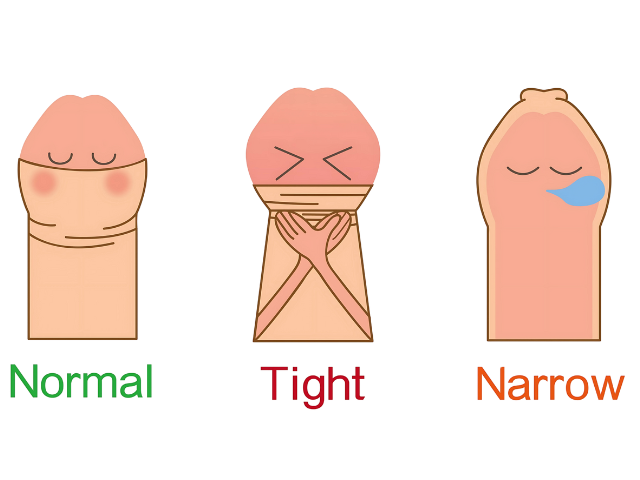Get expert Urologic Care for Tight Foreskin at KK Virat Super Speciality Hospital, Karimnagar, we provide advanced diagnosis and treatment for tight foreskin (phimosis). Our expert urologists offer minimally invasive laser treatments, ensuring quick recovery, minimal discomfort, and no visible scars. If you are experiencing pain, difficulty in urination, or infections due to a tight foreskin, consult our specialists today for the best medical care.
Understanding Tight Foreskin
The problem of tight foreskin affects many men at different stages of life. Various factors contribute to this condition, and its cause often depends on the patient’s age.
What is Tight Foreskin?
Tight foreskin (phimosis) is a condition where the foreskin cannot be retracted (pulled back) over the tip of the penis. This may lead to swelling, pain, and discomfort. While it is normal in infants and young boys, it can become problematic in adults, causing issues such as pain, urinary infections, and inflammation.
If you experience symptoms like swelling, tenderness, pain during urination, or frequent urinary infections, it is crucial to consult a urologist at KK Virat Super Speciality Hospital, Karimnagar for proper diagnosis and treatment.

Treatment Options for Tight Foreskin
If the condition does not cause significant symptoms, it may not require immediate treatment. However, if it leads to pain, difficulty in urination, or discomfort during intercourse, medical intervention is necessary.
The treatment options include:
- Topical Corticosteroids: Ointments like hydrocortisone help soften the foreskin.
- Antibiotics: Used in case of infections.
- Surgical Procedures: If medications fail, surgery is the most effective solution.
Our expert urologists recommend minimally invasive laser procedures for a quick and painless recovery.
Diagnosis of Tight Foreskin
A physical examination is usually enough to diagnose tight foreskin. However, additional tests like blood tests may be required to detect infections or other underlying conditions that could complicate the treatment.
Surgical Treatments for Tight Foreskin
At KK Virat Super Speciality Hospital, Karimnagar, we offer advanced minimally invasive surgical treatments for tight foreskin. Our procedures ensure quick recovery, minimal discomfort, and no visible scars.
1. Circumcision
- Surgical removal of all or part of the foreskin.
- Performed at any age.
- Recommended for severe phimosis or chronic infections.
- Laser circumcision – Painless, bloodless, stitch-free, and ensures faster healing.
- Reduces the risk of STIs, urinary infections, and penile cancer.
- Quick recovery – Patients can resume normal activities in 48 hours.
2. Preputioplasty
- Involves small incisions to stretch and widen the foreskin.
- Preserves the natural appearance of the penis.
- Suitable for men who do not want a complete circumcision.
3. Frenuloplasty
- Involves releasing the tight frenulum (underside of the penis).
- Increases foreskin flexibility and mobility.
- Helps relieve pain during intercourse.
Causes of Tight Foreskin
Tight foreskin can occur naturally or due to external factors. Some common causes include:
- Skin Conditions: Eczema, psoriasis, lichen planus, and lichen sclerosis.
- Scar Tissue (Preputial Adhesions): Prevents foreskin from retracting.
- Infections: Bacterial or fungal infections, including STIs.
- Inflammation: Conditions like balanitis, balanoposthitis, or paraphimosis.
- Poor Hygiene: Inadequate cleaning can lead to irritation and infections.
Types of Tight Foreskin Conditions
There are two types of tight foreskin conditions:
- Physiologic Phimosis: Naturally occurring in young boys, usually resolves on its own.
- Pathologic Phimosis:De velops due to infection, inflammation, scarring, or poor hygiene. This requires medical attention
Why Treat Tight Foreskin?
Untreated phimosis can lead to several complications, including:
- Pain during intercourse.
- Increased risk of infections.
- Difficulty in urination.
- Reduced male fertility.
Why Choose KK Virat Hospital for Tight Foreskin Treatment?
At KK Virat Hospital, Karimnagar, we provide advanced and effective treatments for tight foreskin (phimosis) with precision and care. Here’s why we are the preferred choice for urological treatments:
- Expert Urologists – Specialists trained in advanced foreskin surgeries.
- Modern Facilities – Equipped with cutting-edge surgical and diagnostic tools.
- Minimally Invasive Procedures – Laser circumcision for a painless, quick recovery.
- Comprehensive Patient Care – From diagnosis to post-surgical follow-ups.
- Affordable Treatment – Cost-effective pricing with insurance assistance available.
Your Health, Our Priority – Book Your Consultation Today!
If you are experiencing discomfort due to a tight foreskin, consult our expert urologists at KK Virat Super Speciality Hospital, Karimnagar, for the best treatment options.
- Call Us Directly: Get in touch with our medical coordinators to schedule an appointment with an expert urologist.
- Direct Visit: You can visit our hospital directly by carrying your previous medical records if you have a medical history. However, admission will be based on the doctor’s recommendation.
What is the best treatment option for tight foreskin?
The best treatment depends on the severity of the condition. Mild cases can be treated with topical steroid creams, while moderate to severe cases may require surgical procedures like circumcision, preputioplasty, or frenuloplasty. Laser circumcision is the most effective, safe, and painless option for quick recovery.
Can I have sexual intercourse after tight foreskin surgery?
Yes, but it is recommended to wait 4-6 weeks after surgery to allow complete healing. Engaging in intercourse too soon may cause discomfort or complications. Your doctor will provide personalized advice based on your recovery progress.
What causes tight foreskin?
Tight foreskin (phimosis) can be caused by:
- Natural Development – Common in infants and young boys.
- Infections – Such as balanitis or sexually transmitted infections (STIs).
- Poor Hygiene – Leading to irritation and scarring.
- Skin Conditions – Like eczema, psoriasis, or lichen sclerosus.
- Scar Tissue Formation – Due to repeated infections or injury.
How effective are creams and ointments for tight foreskin?
Topical steroid creams (like hydrocortisone) can help in mild cases by reducing inflammation and improving foreskin flexibility. However, they are not always effective and do not provide a permanent solution for severe cases, which may require surgical intervention.
What happens if a tight foreskin is left untreated?
Untreated phimosis can lead to serious complications, including:
- Pain and difficulty in urination
- Increased risk of infections (UTIs, balanitis)
- Pain during sexual intercourse
- Paraphimosis (a medical emergency where the foreskin gets trapped behind the glans)
Is tight foreskin a serious problem?
Tight foreskin is not always a serious issue but can become problematic if it causes pain, infections, or urinary difficulties. If left untreated, it may lead to complications like scarring, recurrent infections, and restricted blood flowto the penis.
How long does it take to recover after tight foreskin surgery?
Most patients recover within 1-2 weeks, but complete healing may take 4-6 weeks. Laser circumcision has a faster recovery time, allowing patients to resume normal activities in 48 hours. Your doctor will provide post-surgery care instructions for a smooth recovery.
What are the risks and complications of tight foreskin surgery?
While laser circumcision and other surgeries are generally safe, potential risks include:
- Mild pain or swelling (resolves in a few days)
- Infection (rare with proper care)
- Bleeding or scarring (minimal with laser procedures)
- Temporary sensitivity during healing
At KK Virat Hospital, Karimnagar, we ensure a safe, painless, and quick recovery with expert urological care.
What are the symptoms of a tight foreskin?
Tight foreskin, also known as phimosis, can cause symptoms such as difficulty retracting the foreskin, pain or discomfort during urination and intercourse, swelling, redness, frequent infections like balanitis, and scarring or thickening of the foreskin. If you notice any of these symptoms, it is advisable to seek medical attention.
When should I consult my healthcare provider about tight foreskin?
You should consult a urologist if you experience pain during urination, recurrent infections, swelling, painful intercourse, or if your foreskin becomes stuck behind the glans (paraphimosis). If symptoms persist despite using home remedies or prescribed treatments, medical intervention may be necessary.
Can I have sex while having a tight foreskin?
While it is possible to have sex with a tight foreskin, it can be uncomfortable and may lead to small tears, pain, or an increased risk of infections. If you experience pain during intercourse, it is best to consult a doctor to explore treatment options that can improve your sexual health and comfort.
What is the best treatment option for tight foreskin?
The best treatment depends on the severity of the condition. Mild cases may improve with topical steroid creams and stretching exercises. However, for persistent or severe phimosis, surgical options such as laser circumcision, preputioplasty, or frenuloplasty provide effective and permanent solutions. Laser circumcision is a preferred methoddue to its painless, bloodless, and quick recovery process.
How effective are creams and ointments for tight foreskin?
Topical corticosteroid creams, such as hydrocortisone, can help loosen the foreskin and improve flexibility when used consistently. However, they may not be effective for severe cases, and surgical intervention might be necessary for long-term relief.
What happens if a tight foreskin is left untreated?
If left untreated, tight foreskin can lead to complications such as recurring infections, painful urination, difficulty maintaining hygiene, and in severe cases, conditions like paraphimosis (where the foreskin gets trapped behind the glans) and restricted blood flow to the penis, which can be a medical emergency.
Is tight foreskin a serious problem?
While tight foreskin is not always a medical emergency, it can cause significant discomfort, increase the risk of infections, and lead to complications if untreated. If it affects your daily activities or sexual health, seeking medical advice is recommended.
How long does it take to recover after tight foreskin surgery?
Recovery after surgery depends on the procedure. Laser circumcision offers the fastest healing time, with most patients resuming normal activities within 48 hours. Traditional circumcision or preputioplasty may take one to two weeks for complete recovery.
What are the risks and complications associated with tight foreskin surgery?
Tight foreskin surgeries, including circumcision and preputioplasty, are generally safe. Possible risks include mild pain, temporary swelling, infection (rare with proper care), minor bleeding, and temporary sensitivity around the surgical site. Choosing a laser-based procedure significantly reduces these risks and ensures a smoother recovery.
What precautions should I take if I have a tight foreskin?
Maintaining good hygiene is crucial—gently clean the area daily to prevent infections. Avoid forcefully retracting the foreskin, as this can cause tears and scarring. If intercourse is painful, consider using a water-based lubricant. If symptoms persist, consult a urologist for appropriate treatment.
What is the natural treatment for phimosis?
In mild cases, natural treatments like gradual foreskin stretching exercises, warm baths, and steroid creams may help loosen the foreskin. However, if these methods are ineffective, medical treatment or laser circumcision may be the best option for permanent relief.


